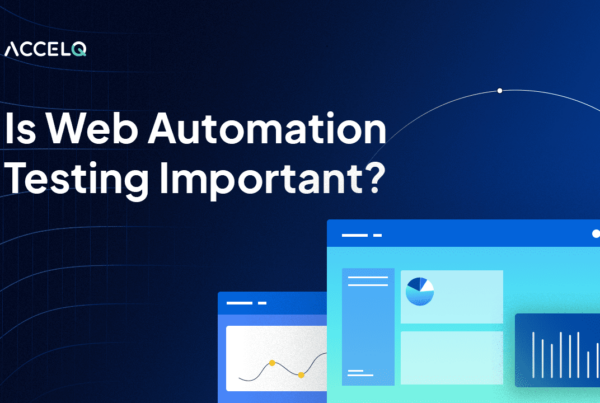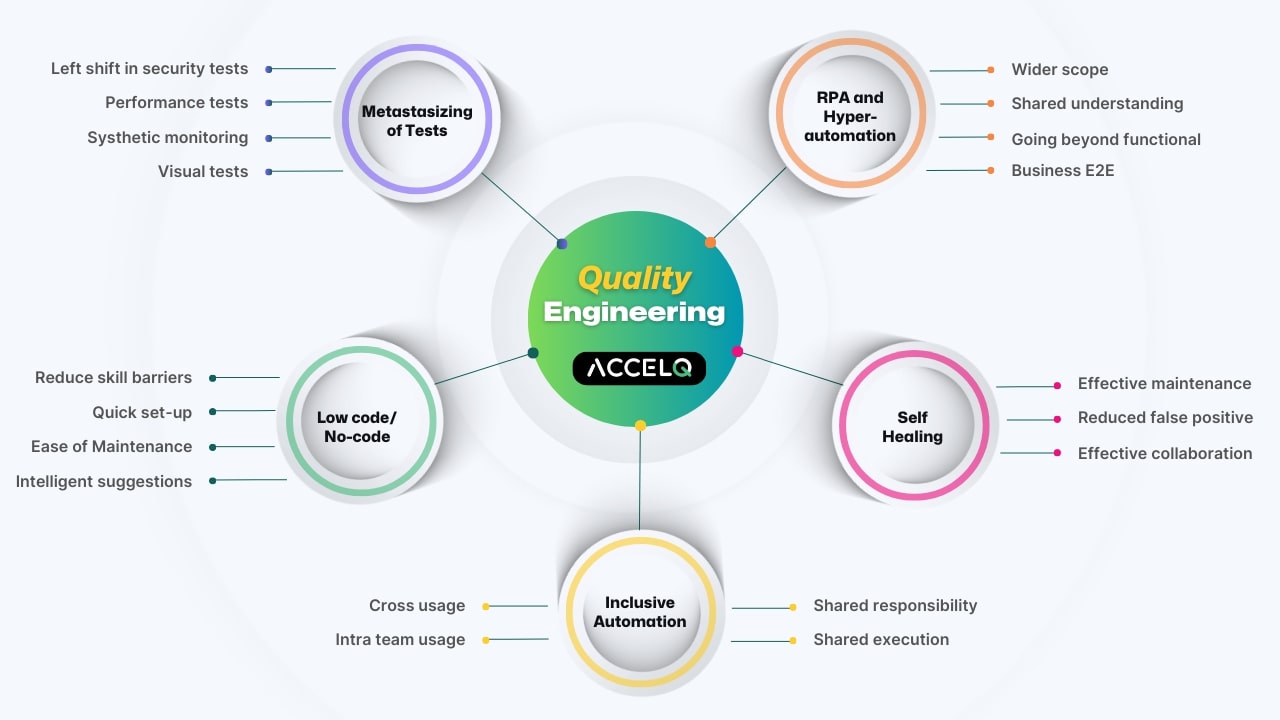Quality Engineering Trends in Test Automation

As cloud solutions multiply, privacy by design principles are being reevaluated as customers become more aware and curious about handling their personal data. Deep changes in software development are still being driven by the quick adoption of new technologies, especially the blockchain, artificial intelligence, and the Internet of Things (IoT).
Intelligent Automation is the way of quality engineering to meet these demands. In this Blog, let us dive deeper into the top quality engineering trends driving quality engineering.
Metastasizing of Tests
Test automation suite design requires meticulous analysis of several elements, including the business domain, consumer behavior, technical constraints, and third-party interfaces. Functional testing has long been the main focus of requirements such as, user experience, performance, and data security are now included.
Visual Tests:
In the realm of contemporary user interface design, where optimization is driven by user emotions and behaviors, techniques like A/B testing are crucial. To keep pace with advances like component-driven development and micro frontends, it's imperative for test engineers to include visual regression for components and conduct visual tests alongside functional validations.
Synthetic Monitoring:
Standard post-production smoke tests are widely used, but business applications must be continuously monitored using synthetic monitoring solutions. These instruments let test engineers integrate with outside systems for thorough supervision and regular inspections.
API Security Testing:
In the face of growing security concerns, the early integration of API security testing in the development cycle is not just important, it's critical. Open-source technologies enable OWASP standards testing, facilitating the early detection of serious vulnerabilities. By initiating these tests on the developer's local machine, a robust test automation suite can ensure data security from the outset, underscoring the urgency and importance of this step.
Low code/No-code tools breaking down the barriers
Organizations are forced by the swift development of technology to expand their quality assurance capabilities. Low-code/no-code systems such as ACCELQ help reduce the difficulty of locating qualified personnel or scheduling training. Through their clever self-healing processes and speedier test suite creation, these platforms help testing teams.
API performance tests
Enhancing user experience in any application, from retail to business solutions, depends critically on performance. Historically, applications were sent to a central performance testing team after passing functional validation tests. To be sure no functional problems emerged after performance modifications, functional testing teams ran a quick regression.
Still, the quick delivery cycles of today make the sequential execution approach ineffective. Especially for APIs, software quality engineering is moving toward adding performance testing early. Including performance tests in current functional suites makes this transition easier.
AI-driven self-healing test automation solutions
The primary cause of test failures in test automation is often the changing user interfaces. Unlike a decade ago, when frontend development was more uniform, today’s use of micro-frontends introduces variability as multiple teams might work on the same UI using different technologies. This variability increases the likelihood of test suite failures if the design is inadequate.
Embracing AI and machine learning tools is the foreseeable and one of the top software quality engineering trends. Test engineers must acquaint themselves with innovative, intelligent test design methods. ACCELQ exemplifies this innovation with its No-Code platform that detects frontend changes and applies machine learning to continuously self-heal, ensuring robust and resilient test automation.
Transformations through RPA and Hyper-automation
Hyper-automation is pivotal in driving digital transformations and is a key trend for the next decade. It transforms manual business processes into automated ones, drastically reducing human intervention. This approach integrates technologies such as IoT, Big Data, AI/ML, and RPA. Organizations leverage hyper automation by using intelligent business process suites, including iPaaS solutions, to significantly enhance their overall business processes, aiming for greater efficiency and reduced error rates.
Conclusion
As software quality engineering advances to meet business needs, test engineers must use intelligent and flexible test automation frameworks to improve efficiency and speed. It is critical to stay current with digital developments and constantly upgrade the automation suite to avoid frequent test automation errors and fully support the organization's operations. ACCELQ supports this approach by providing a No-Code solution that adapts to frontend changes and intelligently self-heals, speeding test automation and aligning with agile techniques to improve overall company agility.
Discover More
 Is Web Automation Testing Important?
Is Web Automation Testing Important?
Is Web Automation Testing Important?
 10 ACCELQ Capabilities You Might Not Know About
10 ACCELQ Capabilities You Might Not Know About

































